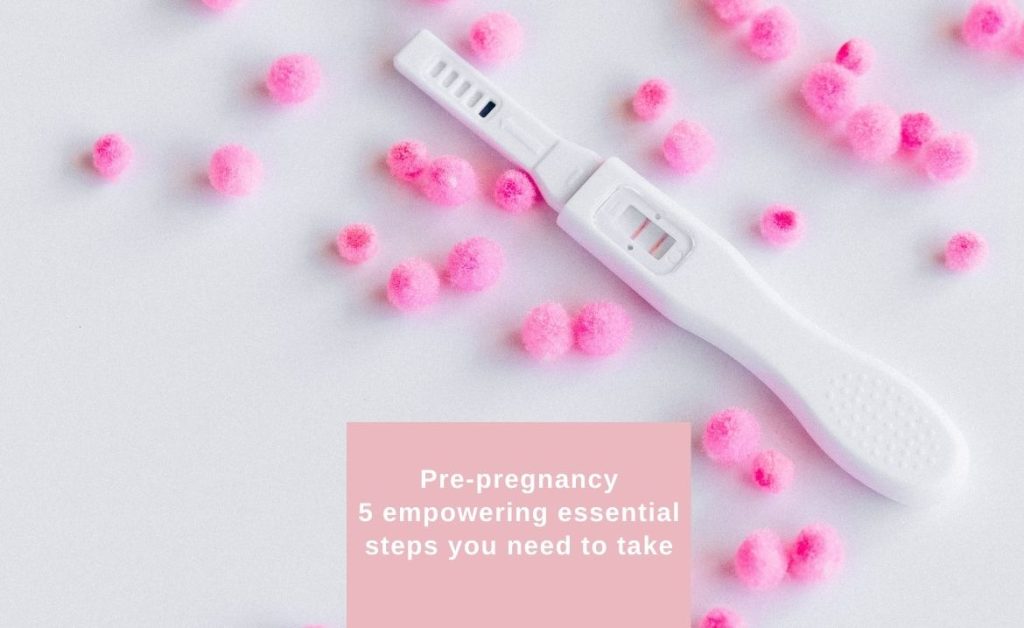So, you’re starting to feel ready to embark on the journey of parenthood.
Those butterflies you feel in your heart, and the thought of ‘I want one too,’ every time you see a baby, reassures you that you are ready to welcome a healthy baby into your life.
Now’s the time to consider taking those all-important pre-pregnancy steps.
But where should you begin?
Like many women, you may feel a sense of both excitement and uncertainty.
To put your mind at ease and ensure you have a healthy, successful pregnancy, we’ve put together a guide of five essential pre-pregnancy steps that will help prepare your body and mind for pregnancy.
Why is pre-pregnancy care important?
Before we reveal the essential steps you need to take to give your baby the healthiest start in life, you must understand the importance of pre-pregnancy, also known as preconception care.
You may have heard it time and time again – poor health, diet and lifestyle can lead to poor fetal and infant growth, leading to unhealthy birth outcomes. This may also result in your child developing long-term health issues, such as a metabolic disease or cardiovascular disorders.
The good news is that there are a few simple steps you can take to lay the foundations for a successful, healthy pregnancy months in advance.
5 Steps to pre-pregnancy care
Step 1: Schedule a Preconception Checkup
The journey begins in a doctor’s office, where you will discuss your medical history, current medications, and any potential risks. Your doctor will also order routine blood tests and possible vaccinations.
Step 2: Adopt a Nutritious Diet
It’s time to swap out those processed snacks for vibrant, colourful, healthier foods, such as
- Fruits
- Vegetables
- Lean protein
- Whole-grains
- Low-fat, high-fibre foods.
Eating well will not only be good for your health and your baby, but it will also make you feel energised and strong. In turn, you’ll be building a healthier environment for your baby to grow in.
Along with a well-balanced diet, there are a few supplements your doctor may recommend, which include:
Folic Acid
At least one month before the planned pregnancy, and for the first three months of your pregnancy, it is recommended that you take folic acid to reduce the effects of neural tube defects and spina bifida (the incomplete development of the baby’s brain or spinal cord).
Iodine
Did you know that iodine is essential for the production of thyroid hormones? And it doesn’t just stop there. These hormones are critical to the development of the brain and nervous system of the fetus. One way to get iodine is through foods such as seaweed, shellfish, eggs, tuna or cod. In saying that, many Australian women don’t get enough iodine from food; therefore, supplementation may be suggested to ensure you get the right amount.
Vitamin D
We all love a bit of sunshine! But the truth is, with the use of sunscreens, indoor lifestyles in offices most of the week, and even our skin tone can be a barrier to receiving enough vitamin D. Your doctor may request a blood test to determine whether you have a vitamin D deficiency. Considering the results, they may suggest the right dose of vitamin D supplements for you.
Step 3: Focus on Healthy Habits
Many of us love that cup of coffee in the morning. However, as you begin your journey towards planning for motherhood, it is recommended that you reduce caffeine intake. Along with this, you must avoid
- Smoking
- Alcohol intake
- Recreational drugs
Make sure to exercise regularly. Whether it’s yoga, brisk walks, or swimming, staying active and making it part of your routine.
Step 4: Manage Stress and Mental Health
You might feel that you’re already managing your stress or that it’s something to tackle once you see those two pink lines.
The truth is, stress and mental health can have a huge impact on your preconception planning. This can include fertility issues and delays, amongst other factors.
Before, during and after pregnancy, your emotional wellness is just as important as physical health. Focus on avoiding stress and getting adequate rest. Some ways to do this are through:
- meditation,
- journaling, and
- open conversations with loved ones.
Step 5: Review Family History and Genetics
Finally, one step that’s often overlooked is the consideration of genetic disorders. Think you and your partner are in good health? Think again. Sometimes, things can be missed. So, while your doctor will discuss your family history, Questioning and considering getting a genetic test done is a crucial step. doctors can detect the potential of any of the following disorders and risks of having a child with
- Cystic fibrosis
- Muscular dystrophy
- Fragile X Syndrome
Small steps lead to big changes
While you may feel overwhelmed, all the above will help avoid miscarriages, fertility challenges, risks and complications. As you take one step at a time, you’ll find a flow and ease into the journey.
At Wollongong Obstetrics and Gynaecology, we’re here to support you through every stage of your pregnancy journey – right from preconception and beyond.
If you are ready to take the next step or have any questions, book an appointment with Dr Khothari today. Together, we’ll help you prepare physically and mentally for the journey ahead.

